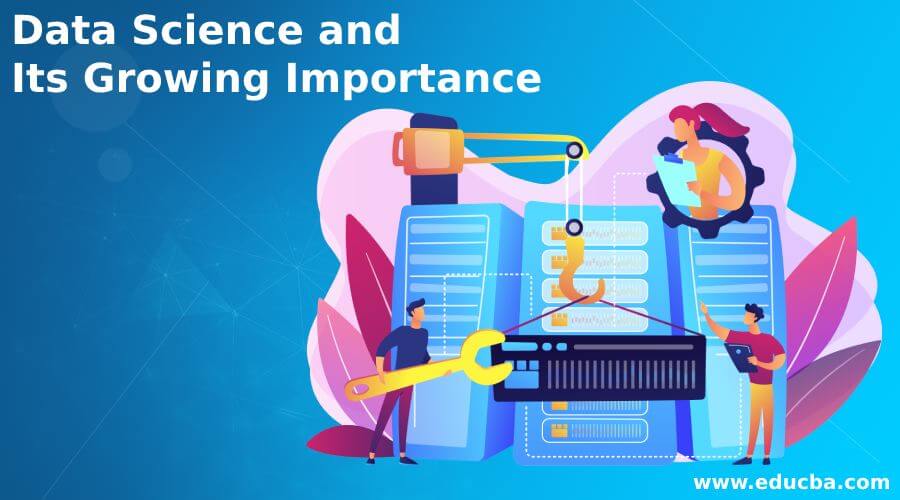Updated April 13, 2023

Introduction to Data Science and Its Growing Importance
Data Science and Its Growing Importance – An interdisciplinary field, data science deals with processes and systems that extract knowledge or insights from large amounts of data.
Data extracted can be either structured or unstructured. It is a continuation of data analysis fields like data mining, statistics, and predictive analysis.
A vast field, it uses many theories and techniques that are a part of other fields like information science, mathematics, statics, chemometrics, and computer science.
Some data science methods include probability models, machine learning, signal processing, data mining, statistical learning, database, data engineering, visualization, pattern recognition and learning, uncertainty modeling, and computer programming.
With so much data, many aspects of data science are gaining immense importance, massive data.
It is not restricted to big data, a big field, because big data solutions focus on organizing and pre-processing rather than analyzing the data.
Also, machine learning has enhanced data science’s growth and importance in the last few years.
What is the origin of Data Science?
Over the years, it has become integral to many industries, like agriculture, marketing optimization, risk management, fraud detection, marketing analytics, and public policy.
It tries to resolve many issues within individual sectors and the economy by using data preparation, statistics, predictive modeling, and machine learning.
It emphasizes the use of general methods without changing their application, irrespective of the domain. This approach differs from traditional statistics and focuses on providing solutions specific to particular sectors or domains.
The traditional methods depend on providing solutions tailored to each problem rather than applying the standard solution.
Today, it has far-reaching implications in many fields, both academic and applied research domains like machine translation, speech recognition, and digital economy on the one hand, and fields like healthcare, social science, and medical informatics on the other hand.
It affects the growth and development of a brand by providing a lot of intelligence about consumers and campaigns through data mining and data analysis techniques.
This history can be traced over fifty years back and was used as a substitute for computer science in 1960 by Peter Naur.
In 1974, Peter published the Concise Survey of Computer Methods, where he used the term data science in his survey of contemporary data processing methods.
These methods were then used in several applications. Almost twenty-two years later, in 1996, the International Federation of Classification Societies met Kobe for their biennial conference. Data science was used for the first time in the conference title, Data Science, classification, and related methods. C.F. Jeff Wu 1997 gave an inaugural lecture on the topic in which he spoke about statistics being a form of data science.
Later in 2001, William S. Cleveland introduced data science as an independent discipline. In his article, Data Science: An Action Plan for Expanding the Technical Areas of Statistics, he incorporated advances in computing with data published in the International Statistical Review in April 2001.
The report mentions six areas that he thought formed the base of data science: multidisciplinary investigations, models, methods for data, pedagogy, computing with data, theory, and tool evaluation.
In the next year, in 2002, the International Council for Science: Committee on Data for Science and Technology started the publication of Data Science Journal, which focuses on issues related to data science like a description of data systems, their publication on the internet, application, and legal issues.
In January 2003, Columbia University also began the publication of the Journal of Data Science, a platform for data workers to share their opinions and exchange ideas about the use and benefits of data science.
A journal that was devoted to applying statistical methods and qualitative research, this journal was a platform that provided data workers with a voice of their own in the field of data science.
In 2005, the National Science Board published Long-lived Digital Data Collections: Enabling Research and Education in the 21st Century.
This article defined data scientists as information and computer scientists, database and software programmers, disciplinary experts, curators and expert annotators, and librarians who are extremely important for the successful management of digital data collection.
Their primary activity is to conduct creative inquiry and analysis so that data can be utilized properly and effectively by organizations across all sectors.
Image source: pixabay.comThe growing importance of data science has, in turn, led to the growth and importance of data scientists. These data scientists professionals are now integral to brands, businesses, public agencies, and non-profit organizations.
These data scientists work tirelessly to make sense of a large amount of data and discover relevant patterns and designs to be effectively utilized to realize future goals and objectives.
This means that data scientists are gaining prime importance, and understanding data properly is reflected in their rising salaries.
According to a recent study by McKinsey Global Institute, there is a shortage of analytical and managerial talent, especially as they need to make sense of the large amount of data available in the world.
This is one of the most pressing challenges in current times. Further, this report estimates that by 2018, there will be a requirement of four to five million data analysts.
There is also a need for close to one million managers and analysts who can help consume big data results to help organizations reach their goals using resources strategically and helpfully.
Why is data science so important?
Over the past few years, it has come a long way. That is why they are integral to understanding many industries’ working, however complex and intricate.
Here are ten reasons why it will always remain an integral part of the culture and economy of the global world:
- It helps brands to understand their customers in a much enhanced and empowered manner. Customers are the soul and base of any brand and have a great role in their success and failure. With data science, brands can connect with their customers in a personalized manner, thereby ensuring better brand power and engagement.
- One of the reasons why it is gaining so much attention is because it allows brands to communicate their story in such an engaging and powerful manner. When brands and companies comprehensively utilize this data, they can share their story with their target audience, creating better brand connections. After all, nothing connects with consumers like an effective and powerful story that can inculcate all human emotions.
- Big Data is a new field that is constantly growing and evolving. With so many tools being developed, big data is almost regularly helping brands and organizations solve complex problems in IT, human resources, and resource management effectively and strategically. This means effective use of resources, both material and non-material.
- One of the most important aspects of data science is that its findings and results can be applied to almost any sector, like travel, healthcare, and education. Understanding the implications of data science can go a long way in helping sectors analyze their challenges and address them effectively.
- It is accessible to almost all sectors. A large amount of data is available today, and utilizing them properly can spell success and failure for brands and organizations. Properly utilizing data will hold the key to achieving goals for brands, especially in the coming times.
That being said, it is taking on a big and prime role in brands’ functioning and growth process. Being a data scientist is a prime position for any person as they have the big task of managing data and providing solutions for their problems, both within and outside the organization.
Today, data scientists are opening new grounds in terms of experimentation and research. They are experimenting with intelligence-gathering technologies and developing sophisticated models and algorithms to help brands answer some of their biggest challenges. A data scientist will perform major functions and roles, some of which include the following:
- Link new and different data to offer products that meet the aspirations and goals of their target customers
- Use señor data to detect weather conditions and reroute supply chains.
- Uncover frauds and anomalies in the market
- Advance the speed at which data sets can be accessed and integrated
- Identify the best and most innovative way to use the internet so that brands can comprehensively use opportunities.
Data science can have huge implications in retail and beyond, such as recreating the personal touch of local shopkeepers.
This shopkeeper was able to meet the customer’s needs in a personalized manner. With time, however, this personalized attention got lost in the emergence and growth of supermarkets.
However, data analytics can help brands to create this personal connection with their customers. Using this, brands must develop a better and deeper understanding of how customers use their products.
This means competitive retailers will have to understand better how customers use their products. Efficiency means that retailers will have to match the right product to the right customer, even though both these objects are constantly evolving.
What is the future of data science and data scientist?
Data science can have far-reaching implications beyond retail. These include healthcare, energy, and education. Because these fields are constantly evolving, their importance is also rapidly increasing. Healthcare needs to balance discovering new drugs with improving patient care. With data-driven solutions, healthcare can take patient care and satisfaction to the next level.
The healthcare industry is constantly evolving, and it can help them create better care for patients at all stages. Another field that can truly benefit from data science is education. Smartphones and laptops in education can create better opportunities for constructive learning and knowledge enhancement.
Another example of how it can help society is through its application and use of energy. The energy sector is today on the cusp of radical change and transformation. From oil to gas to renewable energy, we need to find new and innovative ways to use energy.
It can help us meet the increasing demand and sustainable future challenges while ensuring the best solutions. Data scientists will have to develop a wide range of solutions to meet challenges across all sectors.
This is not an easy task, so they need the resources and systems that will help them achieve this goal. Data scientists must use high-end tools to create cross-sector solutions and become creative thinkers.
All in all, data scientists are the future of the world today. Data scientists will be integral to addressing global challenges with far-reaching impacts.
Developing the skill and creativity of data scientists worldwide can transform people’s experience of life, products, and services.
Recommended Articles
This has been a guide to Data Science and Its Growing Importance. Here we have discussed the basic concept, origin, importance, and future demand of data science and a data scientist. You may look at the following articles to learn more –


